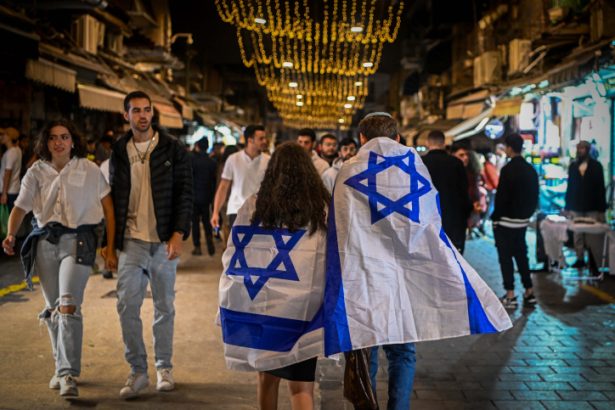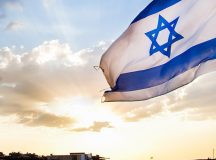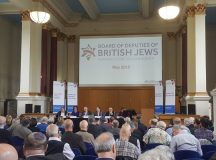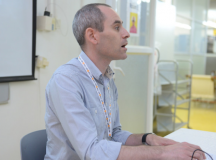The following is a slightly edited version of remarks given by Toby Greene at the Yom Ha’atzmaut & Yom Hazikaron (Memorial Day & Independence Day) event at New North London Synagogue, 13 May 2024. Toby is a former deputy editor of Fathom, a Visiting Fellow in the Middle East Centre at the London School of Economics and a lecturer in the Political Studies Department at Bar Ilan University.
I just returned on Sunday from a short visit to Israel. I mentioned to a few friends there that I would be speaking here this evening and asked them what I should say. What message did they want Jews in Britain to hear about the situation in Israel right now?
Some wanted to speak of their sense of despair. Some wanted to send a message of hope. One friend, a sabra Israeli, gave a classic Israeli response: tell them ‘anakhnu m’khakim le’khem’ (we are waiting for you).
A particularly wise friend said, ‘tell people they have to try to cope with multiple truths.’ I will try to do them all justice.
The first truth, and a strange one, is that on the surface, the lives of most people in Israel have returned to some kind of day-to-day normality. There are many important exceptions of course. Those bereaved and injured. Those with family members in uniform. The families of hostages. Also, more than 100,000 people evacuated in the north and in the south. But for most Israelis, school is running as normal, people are going to work, eating at cafes, even celebrating simchas (family occasions). But that veneer of normality is about a millimetre thick. Below that surface, nothing is normal.
I spent my Shabbat visiting friends in Modiin, where we lived until about a year ago. I stopped by one friend’s house where I was updated that another mutual friend, who serves in a reserve combat unit, was currently in the Gaza Strip. I sat there silently praying for his safety, and for all those who had answered the call to defend the country after the murderous and hate-filled actions of Hamas on 7 October.
At the very same time, we could hear, quite distinctly, deep distant booms coming from the Gaza Strip, about 60km away. The Buchman neighbourhood sits on the southern edge of Modiin. It’s a quiet place, particularly on a Shabbat afternoon, and the sound really does travel. I can only assume it was the sound of heavy Israeli bombing. I could not help but think how terrifying it must be for innocent people in the Gaza Strip to be in the vicinity of those bombs that I could hear 60km away; or what it must be like for a parent in Gaza trying to keep their children safe in those awful conditions.
That evening, I drove with friends from Modiin up to Jerusalem, to a demonstration outside the Prime Minister’s residence, led by the families of Israeli hostages. There were thousands in attendance, joining many more in Tel Aviv and other places, demanding ‘Iska, ahshav’ (an agreement now), to bring the hostages home in return for a ceasefire.
Hamas is demanding an Israeli commitment to end the war as part of the agreement. Netanyahu is not willing to accept that. He and his supporters argue that leaving a remnant of Hamas forces and top leadership in the Gaza Strip is an unacceptable outcome. This situation would present acute policy dilemmas whoever was in power. But Netanyahu is also not willing to say what alternative to Hamas he would like to see take over, an issue which has become a major controversy in Israel.
The mood at the demonstration was one of deep sadness, and no little anger. Family members of hostages were there. We caught sight for example of Jon Polin, the father of American-Israeli hostage Hersh Goldberg-Polin. Hersh’s hostage video, released by Hamas a few weeks ago, showed him with the injury of his severed forearm, which he suffered during the attack.
Many of those attending, bluntly, do not trust Netanyahu and his coalition partners to make the right decisions, for the right reasons.
A statement by one of the speakers struck me in particular. She announced that on Monday evening, instead of the traditional transition ceremony from Yom Hazikaron (Memorial Day) to Yom Ha’atzmaut (Independence Day), the hostage families were organising an alternative event, under the slogan: Eyn Hatufim, Eyn Atzmaut (without the hostages, there is no independence).
Usually in Israel 7.30pm to 8pm is the time of transition. Yom Hazikaron is marked by national and local memorial ceremonies and TV and radio broadcasts which focus overwhelmingly on the stories of people who have been lost. The transition ceremony is supposed to help the country switch from that mood of mourning, to celebrating the birth of the State of Israel, with parties, barbeques, pop music, and fireworks.
But this year the mood is completely different. At least in official ceremonies, there is no upbeat pop music and no fireworks. The traditional national ceremony, which involves heroic individuals being celebrated with the honour of lighting torches, is itself mired in controversy due to widespread anger at the government. Instead of being broadcast live the government chose to have it pre-recorded.
But the message of those hostage families organising an alternative ceremony was even stronger than that. Eyn Hatufim, Eyn Atzmaut, without the hostages, there is no independence. And on one level, there is a deep truth to this, which resonates with how many Israelis feel right now. What does it mean to have independence, if the nation state of the Jewish people cannot fulfil its core purpose to protect Jews, after millennia of persecution? What does independence mean if the state lacks the capacity to return its captives, not thousands of miles overseas but a few kilometres across the border. On that basis, you may well argue, Yom Ha’atzmaut (Independence Day) should be cancelled until the hostages are returned.
And I wondered about that.
On the way back to Modiin we received more difficult news. We heard confirmation that a graduate of the high school in Modiin where our kids attended, 20-year-old Ariel Tsym, was killed in Gaza on Friday. The school was announcing plans for a flag ceremony to greet his family as they took his body for burial on Sunday morning. And I thought again about whether this year, there simply can be no Yom Ha’atzmaut (Independence Day).
In weighing this question, another perspective came to me from an unexpected source. Inevitably, when we got back from the hostage rally, we switched on the television to watch Eurovision. We were just in time to see Eden Golan give a most incredible performance, singing a brilliant song, written by a talented Israeli song writer, in the style of modern Israeli pop-music, including a line in the modern Hebrew language. She stood up to terrible personal abuse and threats, which she did not deserve, and represented herself and her people with dignity and pride.
This is something that previous generations of Jews could simply not have imagined. (There are frankly many things about Eurovision that previous generations of Jews could not have imagined!) But what I want to focus on is the significance of Israel being represented as an equal nation alongside the nations of Europe.
Even in this darkest of moments, we have to be able to take a step back, and see what this represents in the scope of Jewish history, and particularly the history of Jews in Europe. This is a kind of miracle.
Eden Golan is our prompt to remember that Israel is a phenomenal success story. It is the realisation of the prayers of generations of Jews to return to our homeland. Israel is now the world’s largest Jewish community and will be before long home to the majority of the world’s Jews. It has a democratic system that has proven remarkably resilient; a young and growing population; a dynamic economy; and a diverse, culturally rich society. It has provided a home and refuge for millions of Jews from every corner of the world. It is a melting pot, driver and focal point for a flourishing contemporary Jewish and Hebrew culture. And it is above all a political reality which means there is no such thing in the world today as a Jewish refugee.
So this year we do not celebrate like other years. Perhaps ‘celebrate’ is not a word we can really use. But for the sake of the generations who could not have imagined this miracle, it is still right, I think, that alongside Yom Hazikaron (Memorial Day), we come together as a Jewish people not just to mark but to embrace Yom Ha’atmaut (Independence Day). By doing so we affirm that all those who have sacrificed in the creation and defence of the State of Israel, have not done so in vain.
And yet we know also that Israel stands at a fateful juncture.
How to end this war is linked to a wider set of issues about the future of the Palestinian question; the future of Israel’s relations with its neighbours; and what kind of society Israel will be internally. Out of this catastrophe could come (some would argue, and I would be one) a moment of immense opportunity.
A group of Arab states, those that have normalised relations with Israel, and others, primarily Saudi Arabia, that would like to have, are willing to engage with Israel, the US and others on establishing a post-Hamas Palestinian government in the Gaza Strip. They are also ready to integrate Israel into a set of regional security, economic and infrastructure plans that would transform the region.
Advocates of this alliance argue that it would counter threats posed by Iran and its allies and marginalise Hamas. This alliance could also make Israel, and potentially a future State of Palestine, the hub for a critical infrastructure corridor of great geopolitical significance, linking India, the world’s most populous nation, and Europe. The scale of this opportunity in economic and strategic terms is immense.
The condition of course is that Israel makes a credible and irreversible commitment to Palestinian statehood. Palestinians will also have to accept many things, including the replacement of Hamas with a reformed Palestinian Authority in the Gaza Strip.
For various reasons, in this moment of trauma, it is an immense challenge to persuade both Israelis and Palestinians to go along this path. Even an Israeli leadership that wants to go this way will face considerable challenges. Rejectionists in Israel and among the Palestinians, and the Iranian-led axis in the region, will do all they can to prevent it.
Netanyahu’s government is a coalition of factions that will not contemplate Palestinian statehood. Netanyahu, because he is on trial for corruption, is politically dependent on, and therefore captured by, various versions of far-right, radicalised, Jewish ultra-nationalism. For these parties, an extreme brand of modern Jewish Orthodoxy, and territorial maximalism, are valued above liberalism and democracy. They will argue that Palestinian sovereignty is incompatible with Israeli security, and that 7 October is the proof.
These forces are also in a pact with the ultra-Orthodox parties who lend their seats to Netanyahu in return for protection for their social model, built around their state-subsidised educational institutions, and their exemption from conscription. This social model that keeps their young people (in particular young men) from getting a secular education, serving in the army, and integrating into the workforce, in ways that might lead them away from the lifestyle they have been born into.
An election is coming in Israel that, if polls are to be believed (a big if), will sweep this coalition from power. This current ruling coalition will view that as an existential threat, and I assume will fight to avoid that fate using every means they can – democratic and anti-democratic.
We are therefore at a moment of coming together between choices about the future of Israeli society, and choices about the future of Israel’s relations with its neighbours, the wider world, and the Jewish Diaspora. This internal clash to determine Israel’s future will not be easily resolved. It is a struggle that stretches out before us for years to come.
The outcomes, which will be very difficult for any of us to influence, will also profoundly shape our lives as Jews in Britain, whether we like it or not.
These exceptionally fraught times in Israel are coinciding with troubling cultural trends in western societies. We are all seeing the impact of a new wave of identity politics and ideology coming out of the United States, and highly influential in this country, that lumps people into simplified categories of oppressor and oppressed. It adds new impetus to an old narrative that brands Israel (and by extension Jews who are committed to Israel) as white settler colonialists. This claim erases the Jewish historical experience, and lacks any compassion for it.
If there is peace, or even calm in the region, this ideological trend will have much less relevance. If there are governments in Israel that align more closely with liberal values, this problem will be easier to manage. But even in a best-case scenario, we will be living with the legacy of the current war for generations. It is a social and cultural moment that will leave permanent scars in Western societies as well as in the Middle East.
These challenges will shape the experiences of our kids in schools and universities, and the ways we as Jewish communities manage our relationships with other parts of Britain’s complex, multi-faceted society.
As Israel wrestles with these divides, we will continue to face internal disagreements. These will echo those happening in Israel but will also be shaped by the cultural, intellectual and media environment in Britain and the wider Western world.
We will disagree with one another about the situation itself. And we will disagree about our own role, including how we express our views about Israel and its actions in the wider British national, and Jewish global conversation. These dilemmas are not new. But they have grown particularly acute and are likely to remain so.
We have to think carefully about how we manage that situation as a Jewish community today and in the future. This means thinking about how to make space for different perspectives, how to express ourselves without hurting one another, and how to make allowance for the powerful emotions that others may be wrestling with.
I think back to my wise friend who suggested that I should speak about multiple truths. I don’t think she meant that everything and anything is true. Or, conversely, that nothing is really true. I think she meant we need to hold to complexity. That we should recognise that two things that at first seem contradictory may not be. That simplification and generalisation are likely to lead us into misunderstanding.
It is true both that Israel is one of the most remarkable political achievements of modern times, and that (like the world itself) it is a flawed creation that needs our work to perfect.
It is true both that Israel has a duty to protect its citizens from those who wish to harm them, and that it has a duty to minimise harm to Palestinians.
It is true both that ultimately a Palestinian state alongside Israel is a necessity for Israel to sustain itself as Jewish and democratic (and I believe would represent a just reconciliation of legitimate Palestinian and Jewish national rights), and that this prospect is laden with risks for Israel.
It is true both that we cannot celebrate Yom Ha’atzmaut (Independence Day) as we would in other years – and we keep the families of the bereaved and the hostages at the front of our minds, and that Israel is a wonder, whose existence and success we are right to give thanks for, now and into the future.




































